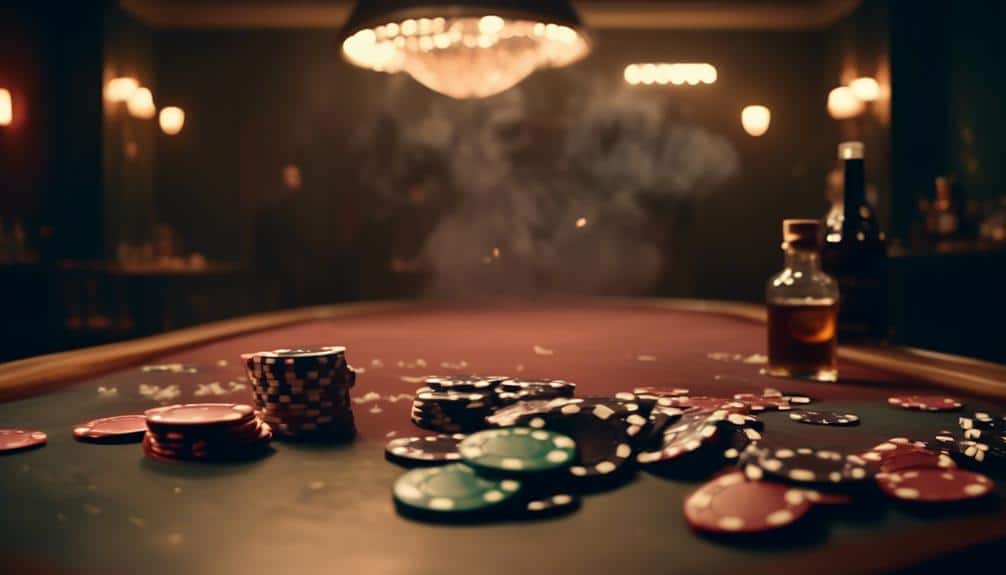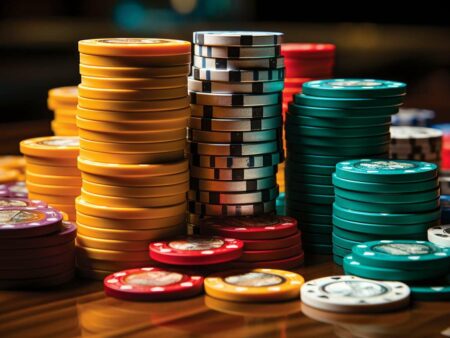It started off as a casual night with friends, a few drinks, and a deck of cards. Little did you know that this seemingly innocent game of poker would soon take a dangerous turn.
As the night wore on, the alcohol flowed freely, blurring the lines between fun and recklessness. Amid the laughter and camaraderie, you found yourself swept up in the adrenaline-fueled world of drunk poker.
But what you didn’t realize was the high-stakes game you were playing, where the odds were stacked against you in more ways than one. The consequences of this risky bet were about to be exposed, revealing the hidden dangers and potential devastation that come with combining alcohol and gambling.

Understanding Drunk Poker
Understanding drunk poker involves recognizing the impact of alcohol consumption on the decision-making abilities and gameplay strategies of players.
The psychological effects of alcohol on the brain are well-documented, and they can significantly impair a person’s judgment and reasoning skills. In the context of poker, this means that players under the influence of alcohol may make riskier bets, fail to accurately assess the strength of their opponent’s hands, and struggle to make sound strategic decisions.
Furthermore, alcohol can also alter the social dynamics at the poker table. As inhibitions are lowered, players may become more aggressive or impulsive, leading to a more unpredictable and volatile game.
Additionally, alcohol can affect players’ ability to read their opponents’ body language and cues, further complicating the gameplay.
Implications of Risk-Taking
Drunk poker’s implications of risk-taking are significant, as alcohol can lead players to take more reckless and uninformed bets. This heightened risk-taking behavior can have serious consequences, both psychologically and socially. Here are three key implications to consider:
- Psychological factors: Under the influence of alcohol, individuals may experience impaired judgment and decision-making abilities. This can lead to overestimating one’s skills, underestimating the risks involved, and making impulsive choices without considering the potential negative outcomes.
- Social influences: The presence of alcohol in a poker game can create a more relaxed and casual atmosphere. This may encourage players to take greater risks, as they seek to impress or outdo their peers. Additionally, peer pressure and the desire to fit in can further influence individuals to engage in riskier behaviors.
- Consequences: Taking reckless and uninformed bets can result in significant financial losses, damaged relationships, and a tarnished reputation. Moreover, the psychological impact of these losses can lead to feelings of shame, regret, and even addiction.
Understanding the implications of risk-taking in drunk poker is crucial to making informed decisions and mitigating potential negative outcomes.
Alcohol’s Impaired Judgment
Alcohol’s influence on judgment becomes evident in drunk poker, as players’ decision-making abilities become impaired. When alcohol is consumed in excess during a poker game, social consequences can arise. These consequences may include arguments, fights, and damaged relationships among players.
The impaired judgment caused by alcohol can lead to reckless behavior, such as making irrational bets or failing to recognize when to fold. This can create a hostile and tense atmosphere, negatively impacting the social dynamics of the game.
Additionally, there are legal implications to consider. In many jurisdictions, playing poker while under the influence of alcohol can be deemed illegal. This can result in fines, penalties, or even criminal charges.
Therefore, players must be aware of the consequences and exercise responsible drinking habits while playing poker.
Link Between Drunk Poker and Gambling Addiction
When players engage in drunk poker, the potential link between this risky behavior and gambling addiction becomes a concerning area of study. Understanding the psychological impact and social implications of this connection is crucial in addressing the issue effectively. Here are three important points to consider:
- Increased Risk-Taking: Alcohol impairs judgment and decision-making abilities, leading players to take more risks while gambling. This can contribute to the development or exacerbation of a gambling addiction.
- Escapism and Emotional Regulation: Drunk poker may serve as a form of escape from negative emotions or stress. Inebriation can temporarily alleviate feelings of anxiety or depression, further reinforcing the association between alcohol, poker, and gambling.
- Social Reinforcement: The social aspect of poker, combined with the influence of alcohol, can create an environment that normalizes excessive gambling behavior. Peer pressure and the desire to fit in with the group can contribute to the development of a gambling addiction.
Consequences: Financial and Emotional
The consequences of engaging in drunk poker extend beyond mere entertainment, encompassing both financial and emotional ramifications.
When alcohol impairs judgment, it can lead to reckless betting and poor decision-making, resulting in financial ruin. In the heat of the moment, players may wager more money than they can afford to lose, jeopardizing their financial stability. The regret and remorse that follow can be overwhelming, as individuals face the consequences of their actions. The financial impact may manifest in debts, bankruptcy, or strained relationships due to unpaid loans.
Furthermore, the emotional toll of losing large sums of money can lead to feelings of shame, guilt, and anxiety, exacerbating mental health issues.
It’s crucial to recognize the potential devastation that drunk poker can cause and approach the game with caution and sobriety.
Conclusion
In conclusion, the practice of playing drunk poker carries significant risks and implications.
The consumption of alcohol impairs judgment and decision-making, leading to potentially reckless behavior and financial consequences.
Furthermore, there’s a strong correlation between drunk poker and gambling addiction, highlighting the potential for emotional turmoil as well.
Individuals need to recognize the dangers associated with this activity and make informed choices to protect their well-being and financial stability.


















